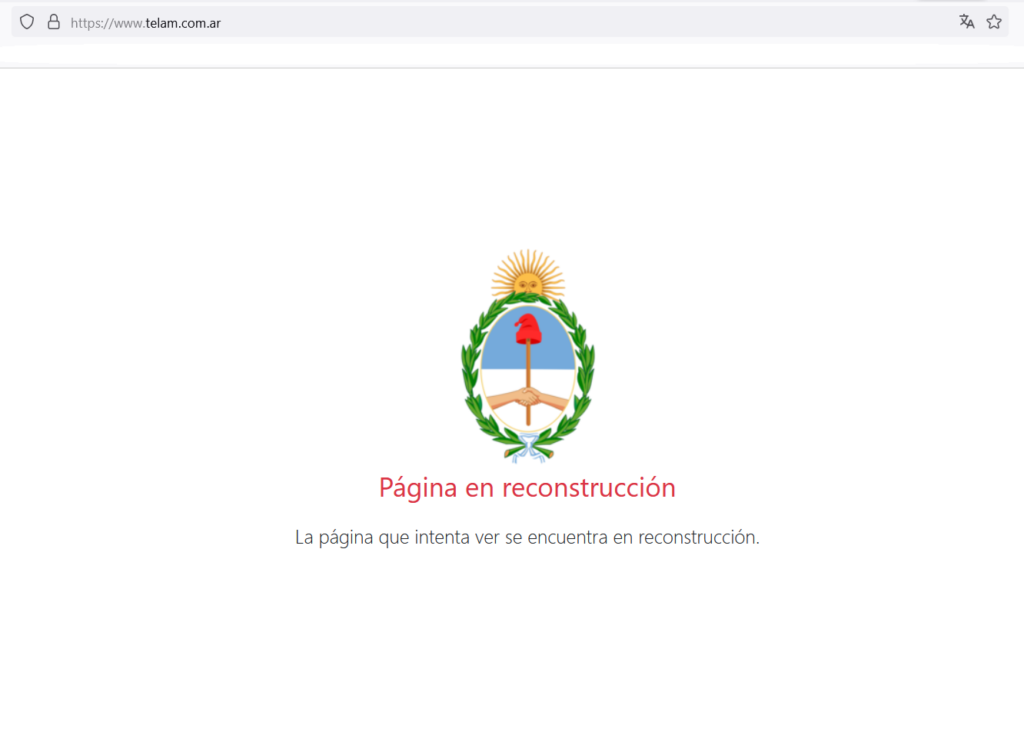Employees of the state-owned news agency Télam and members of Argentine press workers' unions have been camped outside of the public media outlet’s offices in Buenos Aires since March 4.
They are not alone.
The day before, police entered Télam's two locations in the Argentina capital while journalists and other employees were working. Officers installed barriers and positioned themselves in front of buildings to prevent agency workers from entering. An email was sent to all Télam employees informing them that they were exempt from work for seven days, with full pay. The agency's website, with its entire archive of publications, went offline.

Police officers outside Télam's headquarters in Buenos Aires on March 4, 2024. (Photo: somostelam.com.ar)
“We are permanently standing guard to prevent the archives and work materials from being attacked, and also to dialogue with all the people who are nearby and show solidarity,” Tomás Eliaschev, Télam union delegate, told LatAm Journalism Review (LJR) directly from one of the camps.
“We are very distressed, because 770 jobs are at risk and also freedom of expression and federalism, because Télam is the only national media that can connect the entire territory,” he said. “There is a lot of anxiety, but we are also very strong, with a lot of support, with a lot of participation from our colleagues.”
Telám employees received two more emails on March 10 signed by intervener Diego Chaher, appointed at the beginning of February by President Javier Milei to “reorganize” public media. One of the messages stated that the employee dismissal period had been extended to another seven days, while the other informed about the implementation of a voluntary dismissal program for Télam workers.
Despite the measures that suspended the agency's operations, the government is still developing a plan to actually close the state-owned company, according to Presidential spokesman Manuel Adorni.
Meanwhile, Télam workers are organizing themselves in a campaign to defend the agency, including publication of an alternative website to highlight the importance of their work.
The police takeover of the state news agency came after Milei, during the opening of the legislative year in Congress on March 1, spoke about canceling state advertising in the media and the closure of state agencies as measures to “reduce the State to its minimum and indispensable size and purge it of privileges for politicians and their friends.”
“Along these same lines, we are going to close the Télam Agency, which has been used, in recent decades, as a Kirchnerist propaganda agency,” Milei said.
Argentine President Javier Milei addresses Congress during the opening of the legislative year on March 1, 2024. (Photo: Casa Rosada)
Telám, founded in 1945, is one of the state-owned companies – as well as other public media such as TV Pública and Rádio Nacional – that Milei promised to privatize.
As a State company, Télam can only be liquidated by the Executive Branch with authorization from Congress, as established by law 20,705. According to the newspaper La Nación, the government's intention is to revoke this law, as stated in Decree of Necessity and Urgency (DNU) 70/23, which is in force but remains under debate in the Argentine Congress.
One of Milei's justifications for closing Télam is the reduction in public spending. The presidential spokesperson stated that the government's estimate is that the agency would have losses of 20 billion Argentine pesos (US$23.9 million) in 2024. A report by Chequeado states that in 2021, the most recent year with data available, Télam had an operating deficit of 1.8 billion pesos (US$2.1 million). In 2023, Télam's budget was 18 billion pesos (US$21.5 million), Chequeado pointed out.
It is not the first time that an Argentine government has tried to close the state agency, which in 2024 turns 79 years old. The most recent attempt took place during the presidency of Mauricio Macri (2015-2019). In 2018, the Macri government dismissed 357 Télam workers, equivalent to 40% of the agency's employees. The mobilization of workers, who went on strike in protest against the dismissals, and the legal proceedings that the dismissed employees took against the State resulted in the reinstatement of those dismissed.
On March 4, hours after the suspension of Télam's activities and the arrival of the police at the agency, employees of the state-owned company and Argentine press workers' unions held a “symbolic hug” in defense of Télam. They also set up permanent camps in front of the agency's two offices in Buenos Aires, which remain surrounded by barriers and police.
Gathered together under the “Somos Télam” (We are Télam) campaign, the agency's workers also created a website with the same name to continue doing their work and defend the existence of the state-owned company. One of the articles published on the website contains data from Télam itself which shows that, in October 2023, the agency had 803 clients who paid to use its content in text, photos, infographics, audio and video.
That month, according to these data, Télam produced 12,844 articles; 6,030 photos; 761 newsletters; 72 infographics; 152 pieces of audio and 402 videos. Its customers downloaded 395,000 stories from its cable news service and used 24,996 photos. The agency's website, which offers its journalistic content free of charge to the public, was visited by 8.7 million people.
Télam is one of the few Argentine media outlets with a presence in the country's 23 provinces, not just in Buenos Aires, where its central newsroom is located. Therefore, it is able to cover areas that are not covered by the major national media and that do not have local journalistic outlets. And both local and national media rely on the content produced by Télam and reproduce it or use it to produce their own reporting, according to a report on the Somos Télam website.

Télam workers protest outside the state agency. (Photo: somostelam.com.ar)
Eliaschev said the workers will continue to carry out public demonstrations in defense of the agency, and are also working on a bill whose details are yet to be announced. The piece of legislation under development, according to him, “has to do with parliamentary control and it has to do with Télam not being subject to the designs of the government in power.”
“We are going to act very strongly on Congress to take advantage of this unfortunate situation so that Télam improves. We are taking this very bad situation as, 'well, at least it gives us the possibility of telling the entire country because it is important that there be public media,” Eliaschev said. “Argentina is a very large and very unequal country that needs a state media where the news is not a commodity, or the search for ratings is not the priority, but rather it’s the social service provided by the agency so that all sectors of the country can inform and be informed.”
Martín Becerra, a university professor and researcher specializing in communication policies, told LJR that Télam, under all Argentine governments since its founding, “had favorable treatment towards officialism.” He agrees that there is an editorial bias in the state agency, but disagrees with the closure or privatization of Télam, which are the Milei government's proposals.
“The solution to editorial bias is not the closure of a state media outlet, but rather its professionalization and an institutional design that guarantees that the state media outlet is not so editorially linked to the government in power,” he said.
The closure of Télam, “deprives the majority of Argentines of the most solid federal news production in this country,” he said.
The last major news agency that existed in Argentina, Diarios y Noticias (DyN), which belonged to the Clarín and La Nación groups, closed in 2017 after 35 years.
Becerra sees parallels between Milei and Mexican President Andrés Manuel López Obrador, who effectively closed the state news agency Notimex, which was in its 55th year. For the Argentine professor, the two presidents have “a very visceral contempt (...) about journalistic activity, which they consider that anyone can do.”
“When here in Argentina you hear arguments from those around Milei in favor of the closure of Télam, what they tell you is 'there is Twitter'. As if all Argentines had Twitter, which is false. As if each and every Argentinian had data on their mobile phone to access Twitter, which is also false,” Becerra said. “Such a simplified and erroneous worldview of what the practice of social communication is today in Latin America also leads them to this type of measures.”

Télam's website has been down since March 4, 2024. (Screenshot)
The researcher argues that Télam and all public media should count on the participation of diverse political and social forces in their institutional and daily management: from political forces represented in Congress to journalists' unions, human rights organizations and universities that offer communication and journalism courses.
For Becerra, public media need to ensure that the service they perform is sufficiently plural and representative of the diversity of the population so that society as a whole comes to its defense in the face of measures such as those imposed on Télam by Milei.
He said he believes that the Argentine president acted to close Télam's operations before closing Rádio Nacional or TV Nacional due to the low visibility of the agency's work among the public.
“[Télam] is the least visible link directly seen by the community, because as it is a news agency, Télam's services are intermediated by the media, which are the clients. So, you read Infobae, Clarín, La Nación, Página 12, El Destape, any of the digital media in Argentina, or you listen to any of the private radio and television stations, and there are Télam's services: photography, infographics, videos and texts produced by Télam. Only the public does not see that Télam did that,” he said.
Eliaschev said that one of the objectives of the Télam workers' campaign is precisely to inform society about the importance of the agency's work.
“So far we have massive support from colleagues [from other media], because they are the ones who work with the material provided by Télam. But perhaps the general public, society, does not know what Télam is about or why it is important, why it is not an expense, but rather an investment so that the country is connected and so that there is quality information, verifiable, with all the journalistic rigor in all the territories of the country and not centralized in the city of Buenos Aires,” he said.
LJR attempted to contact the Argentine government, but did not receive a response at the time of reporting.